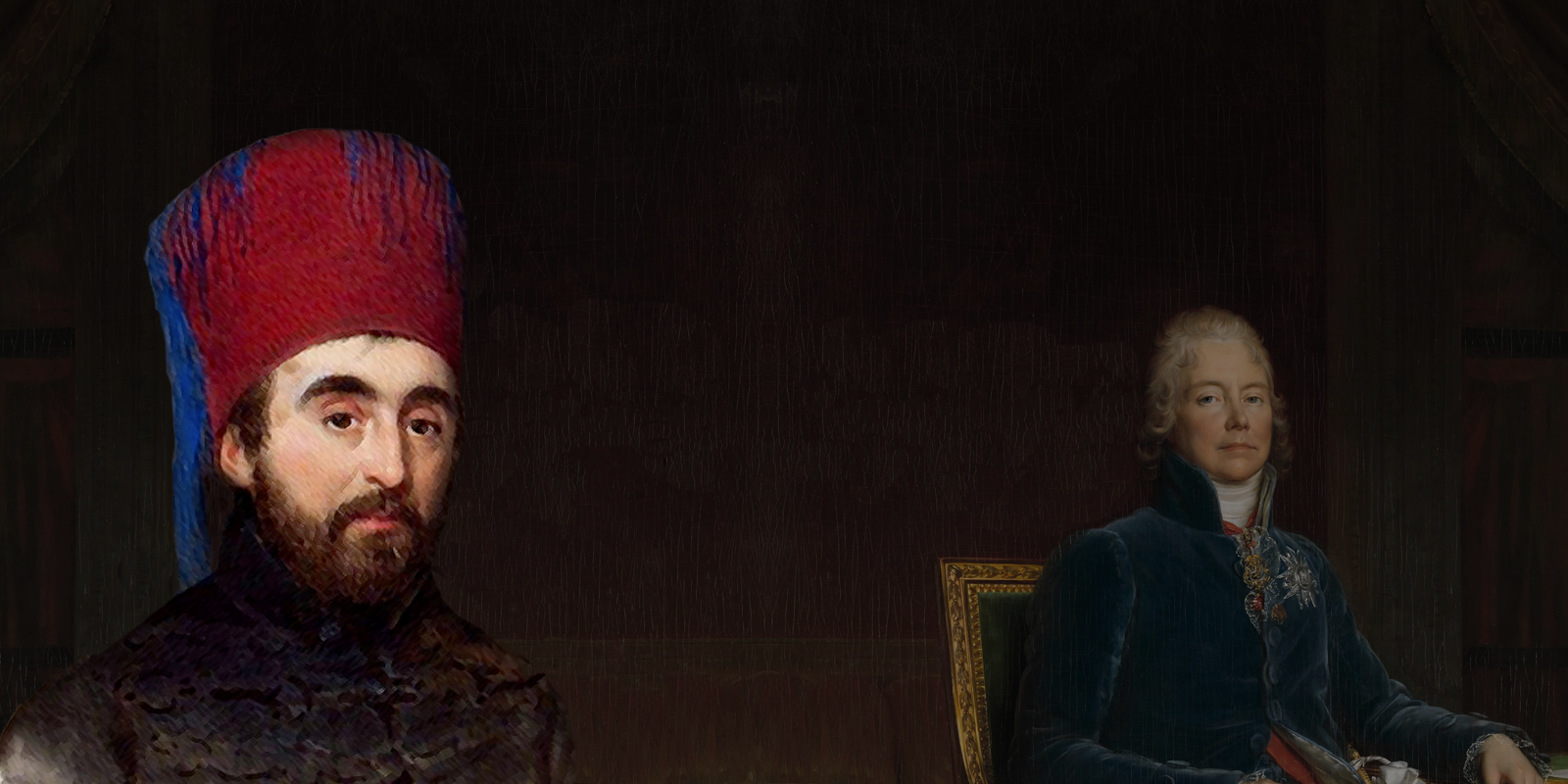A New History of The Eastern Question
hosted by Zeinab Azarbadegan
| How was European military intervention in the Ottoman Empire justified throughout the nineteenth century? What did Ottoman statesmen and subjects think of these would-be attemepts to provide them with more security? From the late eighteenth century, as a new international system was emerging, European powers considered the Ottoman Empire a weaker foil to their own expanding empires. In this episode, Ozan Ozavci explores how this perception of Ottoman weakness, known as the Eastern Question, affected the Ottoman Empire's place in and engagement with the new international system and law. Exploring the different phases of the Eastern Question, from the French invasion of Egypt in 1798 to the Civil War in Greater Syria durings the 1860s, Ozavci highlights agency of individual actors in the Ottoman capital and the provinces.

 | Click for RSS Feed | 
|

|
How was European military intervention in the Ottoman Empire justified throughout the nineteenth century? What did Ottoman statesmen and subjects think of these would-be attemepts to provide them with more security? From the late eighteenth century, as a new international system was emerging, European powers considered the Ottoman Empire a weaker foil to their own expanding empires. In this episode, Ozan Ozavci explores how this perception of Ottoman weakness, known as the Eastern Question, affected the Ottoman Empire's place in and engagement with the new international system and law. Exploring the different phases of the Eastern Question, from the French invasion of Egypt in 1798 to the Civil War in Greater Syria durings the 1860s, Ozavci highlights agency of individual actors in the Ottoman capital and the provinces.
Stream via SoundCloud
Contributor Bios
 |
Ozan Ozavci is Assistant Professor of Transimperial History at Utrecht University and co-convenor of the Lausanne Project. |
 |
Zeinab Azarbadegan is a post-doctoral fellow at the Vienna School of International Studies. She completed her PhD at Columbia University. Her research focuses on imperial knowledge production about the space of Ottoman Iraq by the Ottomans, the Qajars, and the British in the late nineteenth century. |
Credits
Episode No. 526
Release Date: 22 April 2022
Sound production by Zeinab Azarbadegan
Music: "Melodia Arabia" from Franz Hünten's Fantaisie arabe op. 136 (1845). A famous French melody copied from a North African (Egyptian or Algerian) one since 1600s. "Partant pour la Syrie" sung by Joseph Saucier (Canadian National Archives). The lyrics were inspired by the French invasion of Egypt and Syria and was the French national anthem during the Second Empire. "Aldahre Kataâ Awsali " by Munira al-Mahdiyya (Free Music Archive). "Samaii Hijaz Kar Kurdi" by Chahadé Saadé(Free Music Archive)
Images and bibliography courtesy of Ozan Ozavci
Release Date: 22 April 2022
Sound production by Zeinab Azarbadegan
Music: "Melodia Arabia" from Franz Hünten's Fantaisie arabe op. 136 (1845). A famous French melody copied from a North African (Egyptian or Algerian) one since 1600s. "Partant pour la Syrie" sung by Joseph Saucier (Canadian National Archives). The lyrics were inspired by the French invasion of Egypt and Syria and was the French national anthem during the Second Empire. "Aldahre Kataâ Awsali " by Munira al-Mahdiyya (Free Music Archive). "Samaii Hijaz Kar Kurdi" by Chahadé Saadé(Free Music Archive)
Images and bibliography courtesy of Ozan Ozavci
Images
 Jean-Leon Gerome painting ‘General Bonaparte with his Military Staff in Egypt’, 1863.
Jean-Leon Gerome painting ‘General Bonaparte with his Military Staff in Egypt’, 1863.
 Charles-Maurice de Talleyrand-Périgord, Napoleon’s chief diplomat, painting by François Gérard, 1808.
Charles-Maurice de Talleyrand-Périgord, Napoleon’s chief diplomat, painting by François Gérard, 1808.
 Koca Mustafa Reşit Paşa, 1800-1858 (Moritz Michael DAFFINGER, 1790-1849)
Koca Mustafa Reşit Paşa, 1800-1858 (Moritz Michael DAFFINGER, 1790-1849)
 Richard Wood (1806-1900), painting by Lieron Mayer, 1877.
Richard Wood (1806-1900), painting by Lieron Mayer, 1877.
 Costumes maronites, 1843. NY Public Library
Costumes maronites, 1843. NY Public Library
 General view of Beirut in the 1860s., Source: Gallica
General view of Beirut in the 1860s., Source: Gallica
 Selim III, Courtesy of Topkapı Palace Archives
Selim III, Courtesy of Topkapı Palace Archives
 Jacques-Louis David’s Le Sacre de Napoleon, 1807
Jacques-Louis David’s Le Sacre de Napoleon, 1807
Select Bibliography
Candan Badem, The Ottoman Crimean War (1853–1856) (Leiden: Brill, 2010).
Gary J. Bass, Freedom’s Battle: The Origins of Humanitarian Intervention (New York: Random House, 2008).
Yann Bouyrat, Devoir d’intervenir. L’intervention humanitaire de la France au Liban, 1860 (Paris: Vend miaire, 2013)
Juan Cole, Napoleon’s Egypt: Invading the Middle East (New York: Palgrave Macmillan, 2007)
Khaled Fahmy, All the Pasha’s Men: Mehmed Ali, His Army and the Making of Modern Egypt (New York: Cambridge University Press, 1997)
Caesar E. Farah, The Politics of Interventionism in Ottoman Lebanon, 1830–61 (London: I.B. Tauris, 2000);
Leila T. Fawaz, An Occasion for War (London: I.B. Tauris, 1994);
Alexis Heraclides and Ada Dialla, Humanitarian Intervention in the Long Nineteenth Century: Setting the Precedent (Manchester: Manchester University Press, 2015).
Ussama Makdisi, The Culture of Sectarianism: Community, History and Violence in Nineteenth Century Ottoman Lebanon (Berkeley: University of California Press, 2000).
Alexander Mikaberidze, The Napoleonic Wars: A Global History. (Oxford: Oxford University Press, 2020).
Davide Rodogno, Against Massacre: Humanitarian Interventions in the Ottoman Empire (1815–1914) (Princeton, NJ: Princeton University Press, 2011).
Miroslav Šedivý, Metternich, the Great Powers and the Eastern Question (Pilsen: TYPOS, 2013)
Gilbert Sinoue, Le Dernier Pharaon. Méhémet Ali (1770–1849) (Paris: Pygmalion GerardWatelet, 1997)
Ali Yaycıoğlu. Partners of the Empire: The Crisis of the Ottoman Order in the Age of Revolutions (Stanford, CA: Stanford University Press, 2016).











Comments
Post a Comment
Due to an overwhelming amount of spam, we no longer read comments submitted to the blog.